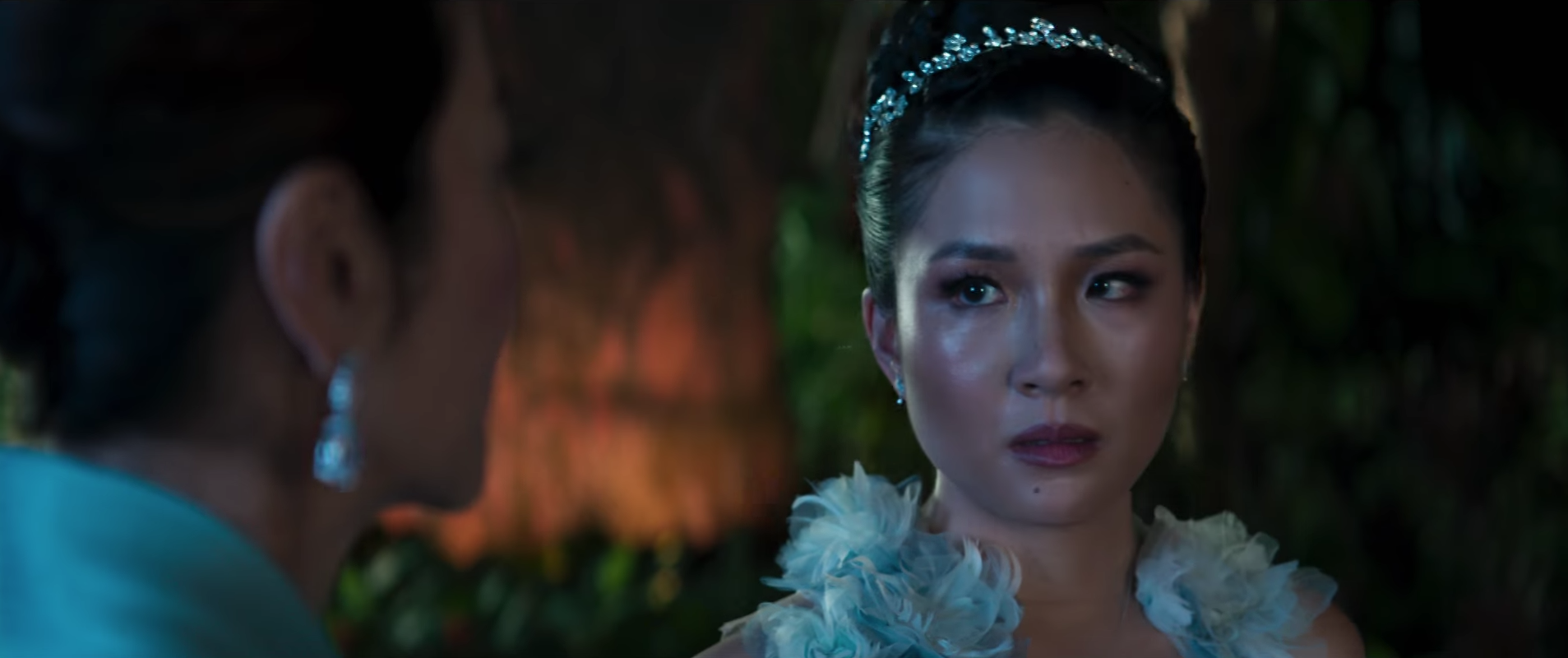Crazy Rich Asians has a money problem
On the dark side of the rom-com that no one wants to talk about


You can learn a lot about Crazy Rich Asians just by paying attention to hands. You see them chop bok choy, stir noodles, and clean fish, and gingerly unload spiky durians from the back of a truck. Hands, too, flaunt giant eye-catching emeralds, lift — gloveless! — million-dollar earrings for a better inspection, and are offered scented bowls of water in which to rinse themselves clean (bowls offered by other, anonymous hands). As might be clear from the movie's title, it is this latter batch of pampered, manicured hands that is the focus of Crazy Rich Asians: These digits are attached to faces and names. And to the film's great detriment, it is the former group of hands that are divorced from bodies, shown only performing work for the crazy rich, but rarely the people behind it.
It is unfair to call this a problem of Crazy Rich Asians exclusively: We are a culture obsessed with wealth, and audiences won't blink twice at penthouse views or montages of designer dresses — stories about high-class high-jinks are regular Hollywood fare, ranging from My Man Godfrey to the literal Real Housewives of Beverly Hills. The problem is that Crazy Rich Asians fetishizes extreme wealth while failing to acknowledge or grapple with the nuances of a system of gross inequality.
Based on author Kevin Kwan's bestselling 2013 novel of the same name, Crazy Rich Asians is a fish-out-of-water story about economics professor Rachel Chu, who travels to Singapore with her boyfriend, Nicholas Young, for a wedding, only to learn he hails from one of the richest families on the island. Nick's family instantly disapproves of Rachel, who they deem a "nobody," and, along with some jealous bachelorettes and ex-lovers, they try to rip Nick and Rachel apart.
The Week
Escape your echo chamber. Get the facts behind the news, plus analysis from multiple perspectives.

Sign up for The Week's Free Newsletters
From our morning news briefing to a weekly Good News Newsletter, get the best of The Week delivered directly to your inbox.
From our morning news briefing to a weekly Good News Newsletter, get the best of The Week delivered directly to your inbox.
Director Jon M. Chu's adaptation has been rightly lauded as a long overdue "win for representation" due to its all-Asian cast. To this point, Crazy Rich Asians' cast is not relegated to stereotypical roles; The Washington Post headline trumpeted that the film has "no martial arts," and The New Yorker praised its "inversion of racial expectation." In that article, writer Jiayang Fan goes on to say: "Crazy Rich Asians has fun deliberately upending the trope of Asians as hardscrabble immigrants (which the Joy Luck Club protagonists were). In one scene, a Singaporean patriarch encourages his children to eat up all their dinner by saying, 'Think of all the starving children in America!'"
While the joke works in the film, delivered by the buffoonish father of Rachel's friend, it is ripped straight out of the novel, which is far more over-the-top than Chu's adaptation. In fact, it's telling what the film changes. Cut is a scene where Nick and his friends spontaneously jet to Australia on a Cessna Citation X to get a proper flat white latte. Also gone is the bachelor party's visit to a dogfight in Macau.
One character who gets a makeover in the film is Michael, a not-quite-as-wealthy man married to an extremely rich socialite. In the movie, Michael is a tortured trope, a man who can't stand that his wife wears "the money pants in the family." In the book, though still villainous, he also seems to be the only person with his head above the water: "I can't watch these people spend a gazillion dollars on a wedding when half the world is starving," he tells his wife.
But the biggest change of all is to the character of Nick's mother, Eleanor. While in the novel she is cartoonishly evil, she is painted to be much more understandable in the film: a protective mother who is also the victim of tradition. Take the prologue, in which Eleanor and her family are refused service by a racist hotel clerk in London. Eleanor responds by calling her husband, who buys the entire hotel on the spot. In the film, Eleanor then demands the clerk mop up the floor; in the book, she fires him. It might be satisfying to see the man get his comeuppance either way — there were victorious whoops in my theater — but the film made a choice to soften her edges.
A free daily email with the biggest news stories of the day – and the best features from TheWeek.com
This has consequences. In the novel, the characters are so abhorrent that even if the book wants you on their side, it's impossible to be. In the movie, I found myself far more conflicted: Am I really rooting for these people? It is an ethically dubious decision. Yes, it makes for a better romantic comedy, but what's lost is any of the novel's ambitions towards satire, scant as they may be.
This is all the more reckless because in Singapore, the abyss between the wealthiest citizens and the poorest is one of the vastest in Asia, second only to Hong Kong. High rises are built by low-paid immigrant laborers, and many live-in maids are little more than indentured servants, women from poorer countries in the region who have few rights or protections.
The novel makes some of these injustices plain, even if it revels disturbingly in them. In one parenthetical aside, we are informed that "the Chinese [maids] were better at cleaning, while the Filipinos were great with the kids." In another, Eleanor eyes a "pretty new Mainland Chinese maid" who is ominously suggested to have been "handpicked" by a friend's husband from a euphemistic "employment agency." Yet in the movie, even though Rachel never speaks directly to the help, much less uses their names, she still obliviously talks with a princess about empowering women through microloans.
Crazy Rich Asians obviously aims to be soapy fun, and there is, on the surface, nothing wrong with that — "it's precisely that embrace of all things lush and unsubtle that makes Crazy Rich Asians such a great time at the theater," David Sims writes at The Atlantic. That's true — up to a point. The problem is that great melodramas inextricably about wealth, such as British television show Downton Abbey, do tackle the complexities of class. The genre is so effective that soap operas and telenovelas have been used by governments and social workers for decades to fight poverty.
When class is not addressed in any meaningful way, you end up with "wealth porn" like 50 Shades of Grey or something as tone-deaf as Sex and the City 2, where the portrayal of Dubai led The Guardian to observe dryly: "You can beat women, you can rape women, and you can throw them in jail when they protest, but as long as you dress the country up all shiny and sparkly, and put it in a pair of Jimmy Choo shoes, nobody will be all that bothered."
Crazy Rich Asians may be dressed in Marchesa, but the point remains the same: Singapore is shiny and sparkly, the hand we care about is Rachel's left, and we all know exactly how the story is going to end before it even begins. It is simply not as fun to be concerned by things like the cost of diamonds or the price of ladies-in-waiting when you go to the theater looking for escape.
The trouble is, for a film whose heart is so deeply rooted in representation, we are offered nothing but a simplified, sugar-coated version of reality. Rather than saying something — about Singapore's elites, our fascination with them, or the serving class that holds the whole fantasy aloft — we are left with a story about wealth for the sake of being about wealth.
"Why," Rachel wonders about her hosts at one point, "would they want to buy a rare Cambodian gong?" The answer is obvious: "Because they can."
Jeva Lange was the executive editor at TheWeek.com. She formerly served as The Week's deputy editor and culture critic. She is also a contributor to Screen Slate, and her writing has appeared in The New York Daily News, The Awl, Vice, and Gothamist, among other publications. Jeva lives in New York City. Follow her on Twitter.
-
 The rise of runcations
The rise of runcationsThe Week Recommends Lace up your running shoes and hit the trails on your next holiday
-
 Amorim follows Maresca out of Premier League after ‘awful’ season
Amorim follows Maresca out of Premier League after ‘awful’ seasonIn the Spotlight Manchester United head coach sacked after dismal results and outburst against leadership, echoing comments by Chelsea boss when he quit last week
-
 ‘Jumping genes': How polar bears are rewiring their DNA to survive the warming Arctic
‘Jumping genes': How polar bears are rewiring their DNA to survive the warming ArcticUnder the radar The species is adapting to warmer temperatures
